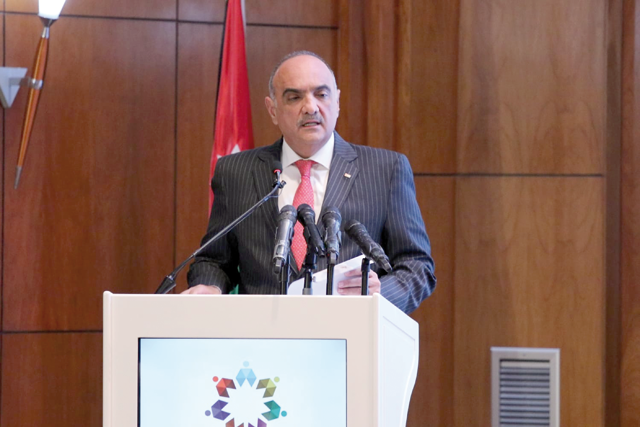You are here
Gov’t to merge ministries as part of public sector modernisation
By JT - Aug 01,2022 - Last updated at Aug 01,2022

Prime Minister Bisher Khasawneh speaks during a press conference in Amman on Sunday (Petra photo)
AMMAN — After briefing His Majesty King Abdullah on the recommendations of the Committee to Modernise the Public Sector, the government on Sunday announced plans to merge a number of ministries and public institutions and reallocate powers pursuant to the reform proposals.
During a press conference attended by a number of ministers and members of the Committee to Modernise the Public Sector, Prime Minister Bisher Khasawneh said that the government through the public sector modernisation roadmap seeks to reach “an effective and empowered public sector” that stands to improve Jordan and the wellbeing of its citizens.
Khasawneh, who is also head of the committee, added that the roadmap identified seven aspects as “a paramount priority” for improvement and modernisation. These include government services, procedures and digitalisation, organisational structure and governance, policy making and decision making, human resources, legislation, and institutional culture, which all form a framework for public sector modernisation.
The premier said that ministries and public departments will be merged over the period of 2022 and 2024 without affecting the rights of their employees, noting that it will not result in any layoffs.
The committee assessed the conditions of 97 public departments, except for security agencies, the Jordan Armed Forces-Arab Army and municipalities, he said.
Khasawneh said that this committee is a government committee, unlike the political modernisation committee that was a Royal committee and differs from the economic teams and workshops that were held under the auspices of the Royal Hashemite Court.
In this regard, he said that this committee was formed under a government decision and comprised ministers, leaders from both the public and private sectors.
The Committee to Modernise the Public Sector worked on three main pillars: Government services, institutional framework and legislative dimension, he said.
Khasawneh noted that under the first executive programme between 2022 and 2025, the committee identified a total of 206 objectives, including institutional reforms, merger of institutions and ministries from 2022 to 2024.
State Minister for Media Affairs Faisal Shboul said that the committee has produced a trans-governmental 10-year plan, in line with the Economic Modernisation Vision and moderinisation of the political system.
Stressing that the modernisation system is the largest in the history of the Kingdom, he said the committee has completed the mission in six months through holding more than 100 meetings, reviewing thousands of documents.
Minister of State for Prime Ministry Affairs Ibrahim Jazi said that the main objective of the legislation aspect of the roadmap is to conduct a comprehensive review of the public sector’s legislations to create a conducive environment for the development of the public sector.
Jazi added that the committee concluded that there is a total of 22 initiatives to consider the current laws, including the comprehensive law that would attract investments and business-stimulator, in addition to amending the civil service system.
Minister of Planning and International Cooperation Nasser Shraideh said that the government’s regulatory structure includes 31 initiatives and recommendations, aimed at enhancing the efficiency and effectiveness of the public sector to serve the citizens, businesses and the investment environment in the Kingdom.
One of the most important recommendations is the establishment of the Ministry of Education and Human Resources Development through merging the Ministry of Education with the Ministry of Higher Education and Scientific Research, in addition to merging the vocational training institute with the new ministry, he said.
The new ministry will serve as an umbrella for the development of human resources in terms of academic, vocational and technical education, and higher education, he added, stressing the importance of aligning the outputs with the requirements of the labour market.
On structural amendments related to the labour sector for 2022-2024, he noted that the Ministry of Labour will be abolished and its functions will be transferred to the relevant ministries, namely the ministries of Interior; Industry, Trade and Supply; Education and Human Resources Development.
He said that the tasks related to regulating the labour market and the national employment programme will be transferred to the Ministry of Industry, Trade and Supply.
Regulating the issues pertaining to foreign workers, including work permits, inspections and violations will be transferred to the Ministry of Interior.
The chairmanship of the board of directors of the Development and Employment Fund and the Social Security Corporation will go to the Ministry of Industry, Trade and Supply, he said.
On amendments to the social services sector, Shraideh said the Ministry of Youth will be merged with the Ministry of Culture to become the Ministry of Culture and Youth throughout 2022-2023.
In regard to the health sector, he said that the Higher Health Council will be transformed to become a regulatory body for the public and private health sectors.
The minister said that the functions of care homes that serve persons with disabilities and the elderly will be transferred from the Ministry of Social development to the Ministry of Health.
On the amendments to infrastructure services, he said that the Ministry of Infrastructure Services will be introduced through the merger of the Ministry of Transport and the Ministry of Public Works and Housing.
The planning minister said that ministries and institutions will be formed under the supervision of four ministerial teams that cover economic growth and prosperity, quality of life, human resources development and employment, facilities and infrastructure.
A new Ministry of Government Communication will be established to serve as an administrative umbrella to draw the government’s media policy and adapt with changes in new media outlets and communication tools, he said, noting that it would work to transfer the association of the Jordan News Agency, Petra, and the Jordan Radio and Television Corporation to the Government Communication Ministry, as well as restructuring them in a way that enables the government communicate effectively with relevant parties and citizens.
He added that a reference unit will be established to draw national policies.
He noted that there will be a “drastic transformation” in the role of the Civil Service Bureau to become responsible for the development process in the general administration in a comprehensive manner, under the title “Public Service and Administration Authority”.
Shraideh added that the Department of Statistics will be restructured to become a national interactive statistical centre to collect data, support policymaking, develop scenarios and make decisions. It would also serve as a comprehensive umbrella for the sustainability of providing all kinds of information, data and sectoral indicators in a timely manner.
Minister of Digital Economy and Entrepreneurship Ahmad Hanandeh attached importance to the aspect related to government services.
He noted that the main parts of government services include: Individuals, technology and procedures, noting that they include “the appropriate legislative environment” for services, including government services that focus primarily on citizens’ well-being.
The automated services will ease citizens’ access to data and documents, he said.
Also on Sunday, the Prime Ministry launched a website — www.govreform.jo — to acquaint the public with the details of the roadmap, providing access to the plan’s executive programme for 2022-2025, Petra added.
Related Articles
AMMAN — The government has begun implementing the public sector modernisation roadmap, which is regarded as the "main lever" for the economi
AMMAN — His Majesty King Abdullah on Sunday reaffirmed that the ultimate objective of modernising the public sector is to improve servi
AMMAN — The Cabinet on Wednesday decided to form a committee to modernise the public sector.During a Cabinet session, virtually chaired by P



















